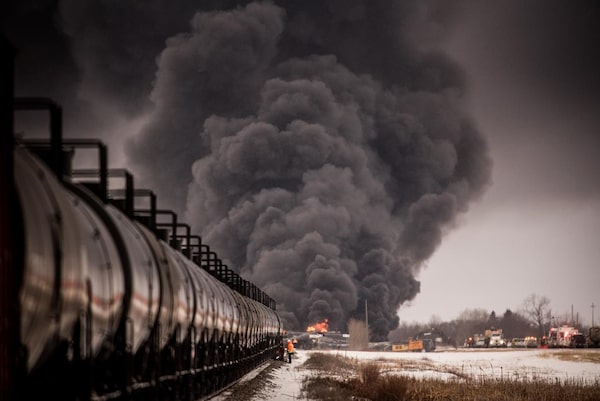
Smoke billows from a derailed Canadian Pacific Railway train near Guernsey, Sask., on Feb. 6, 2020.The Canadian Press
Canada’s two major railways are limiting track space for shipments of oil and other dangerous commodities after the federal government ordered temporary speed restrictions in response to the second fiery oil-train crash since December.
Transport Minister Marc Garneau cut in half the speed limits for trains hauling oil, propane and other flammable goods after a Canadian Pacific Railway Ltd. oil train crashed and caught fire on Thursday in rural Saskatchewan. Another CP oil train burned in December along the same tracks near Guernsey, Sask.
Mr. Garneau, who was unavailable on Monday, said on Feb. 6 the 30-day slowdown could be lengthened or shortened, depending on the results of an undisclosed inquiry by the government.
The new speed limits of 20 miles an hour (32 kilometres an hour) in cities and 25 m/h (40 km/h) in other areas for dangerous goods raises the prospect all other rail traffic, from grain to passengers, will be impeded.
The shipping restrictions, or embargoes in railway parlance, imposed by CN and CP are to ensure oil trains do not get in the way of other freight, said an industry source whom The Globe and Mail is not identifying because he is not authorized to speak publicly on the matter.
The minister’s order “will have a material impact on our overall capacity unless we take steps to protect network fluidity,” CN said in a memo to customers notifying them shippers must apply to the railway for permits to move oil, butane, propane and other flammable goods. “We will continue to move these commodities, but manage the flow through a permit process from our centralized operations centre.”
CN’s move to limit the amount of flammable goods it handles and the interconnected nature of Canada’s rail system prompted CP to impose similar restrictions to “protect our customers and operations," John Brooks, CP’s chief marketing officer, said in a notice to customers. “While CP has undertaken a thorough review over the weekend of tactical management of traffic/trains affected by the slower train speeds, embargo actions taken by CN have caused CP to adjust our plan.”
“We do not take these measures lightly and while it is too soon to quantify the impact, these actions are necessary given the multitude of variables and interdependencies involved in network operations,” Mr. Brooks said in the memo, which was provided by CP.
Meanwhile, protester blockades of tracks owned by Canadian National Railway Co. continued for another day on Monday, adding to disruptions on Canada’s interconnected rail network.
Passenger service Via Rail, which operates largely on CN lines, on Monday cancelled 26 trains between Toronto, Ottawa and Montreal on Canada’s busiest passenger rail corridor because of a blockade at Belleville, Ont., set up by protesters in solidarity with those opposed to a pipeline in British Columbia. CN’s track to B.C.’s port of Prince Rupert is also blockaded.
“There are currently no movements of any trains at both those locations and nearly 200 trains have now been directly impacted since the blockades began,” CN said in a statement. “These blockades are having a severe impact on all Canadians as it is restricting the movement of all goods.”
The protests are unrelated to CN’s business, said Jonathan Abecassis, a CN spokesman.
Walter Spracklin, a stock analyst at Royal Bank of Canada, said CN’s network traffic has also been hampered by recent rockslides, washouts and tunnel problems near Vancouver. He expects the effects will be short term.